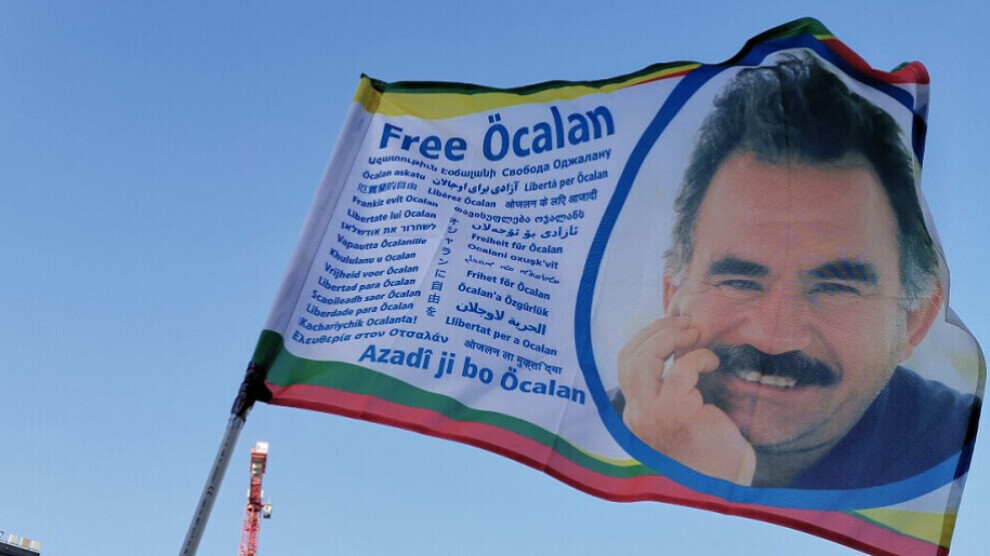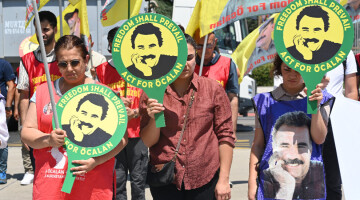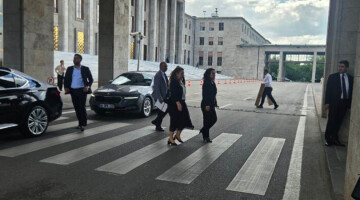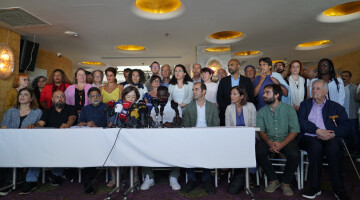69 Nobel laureates wrote a letter to the Committee of Ministers of the Council of Europe, the European Court of Human Rights, the European Committee for the Prevention of Torture and the UN Human Rights Committee. In the letter, the relevant institutions were asked to fulfil their obligations to protect the rights of Kurdish People's Leader Abdullah Öcalan.
The letter was addressed to the Office of the United Nations High Commissioner for Human Rights (OHCHR), Gabrielius Landsbergi, President of the Committee of Ministers of the Council of Europe, Dr Alan Mitchell, President of the European Committee for the Prevention of Torture and Inhuman or Degrading Treatment or Punishment (CPT) and Marko Bošnjak, President of the European Court of Human Rights of the Council of Europe and President of Turkey, Recep Tayyip Erdoğan for urgent consideration.
The letter calling for immediate action for Öcalan reads as follows:
"We, the undersigned Nobel Laureates, write to express our ongoing and deepening concern about the conditions under which Kurdish leader Abdullah Öcalan, despite the persistent attempts of his family, his attorneys, and others, has been held during his 25 years of imprisonment on Turkey's Imrali Island. Those conditions have only worsened since his last communication with the outside world on March 25, 2021, described below.
As European and international entities charged with promoting and protecting human rights and preventing torture, his decades of imprisonment and the various violations of his rights by the Turkish government throughout his imprisonment are not new to you. Nor is this the first time that Nobel Laureates have written about Mr. Öcalan's imprisonment and that of other political prisoners in Turkey.
In January of 2019, at the time of hunger strikes in prisons across Turkey, led by imprisoned Kurdish MP Leyla Güven, 50 Nobel Laureates signed letters in support of the hunger strikers and calling for the end of the isolation of Öcalan. The various letters we signed then were addressed to the Committee for the Prevention of Torture (CPT), the Organization for Security and Co-operation in Europe (OSCE), the European Commission, the Council of Europe, and President Erdogan.
We write again because although Öcalan's lawyers were finally able to meet with him five times in 2019 likely due to the hunger strikes and international pressure, they were the first such meetings since 2011and his attorneys have not been allowed to see him since. Until recently, as noted above, his last known outside contact was a phone call with his brother on March 25, 2021. As he was objecting to the reduction of his rights to communicate and said that “the law should be enforced" and his lawyers should be allowed to meet with him, the call was disconnected. It had lasted only two minutes.
The concern of the Nobel Laureates who have signed this open letter - and of others throughout the international community - arises not only from his isolation and the continuous violations of his rights but also from the apparent lack of meaningful efforts taken by the European entities addressed here as well as the UN Human Rights Committee on his behalf. While his rights are guaranteed under the Turkish constitution and domestic legislation, under statutes and regulations of the European Union, and through international law, none of that seems to matter.
In an attempt to end Öcalan's incommunicado detention, his lawyers appealed to the United Nations Human Rights Committee (OHCHR) on July 29, 2022, as a last resort due to the exhaustion of domestic remedies, including the Turkish Constitutional Court (AYM). They also requested an injunction against the restriction preventing any type of communication with Mr. Öcalan. The OHCHR urged Turkey to end the incommunicado detention and allow him immediate and unrestricted access his lawyers. Instead of complying with the injunction, the Turkish government defended these prohibitions with no legal grounds in its responses to the Committee. No further steps have been taken on his behalf by OHCHR.
Of the three European bodies addressed here, the CPT has had the most access to Imrali Prison and its prisoners and has written 30 reports about its visits there. Despite this, it is unclear what impact its visits and reports have had on the treatment of Öcalan. For example, while the CPT announced that it had visited the prison in September 2022, in a subsequent meeting with his lawyers, it refused to provide them with any information at all about the visit.
But as a result of increasing international pressure, in a press release dated February 23, 2024, the CPT finally confirmed that its members had seen and interviewed Mr. Öcalan and three other prisoners held there during its visit in 2022. Although it had finished a report about that visit in the summer of 2023, the Turkish government did not approve its release to the public. Over the 25 years of Mr. Öcalan's isolation at Imrali, only three of 30 CPT reports on have not been permitted to be released.
The fact that Turkey withheld permission to release this latest report is particularly worrying because in its previous report, the CPT had nothing positive to say about treatment of prisoners at Imrali. Additionally, the CPT is entitled to initiate a procedure to make its observations public without government approval. It can also initiate action against states that do not comply with its recommendations on conditions and treatment of prisoners. Yet the Committee has not taken these steps. All of that begs the question of who is the CPT protecting? The state itself or the people whose rights it is the CPT's duty to defend?
The same might be asked of the European Court of Human Rights (ECHR) which stated that the aggravated life sentence given to Mr. Öcalan in 2014 is against the prohibition of torture and that some changes should be made to the law. The Committee of Ministers is meant to monitor and ensure the implementation of ECHR decisions. Turkey has not implemented this decision, yet the Committee of Ministers only put this issue on its agenda in 2021, seven years after the fact and so far, has taken no effective action on its implementation.
We call upon all of these bodies to fulfill their obligations regarding protecting the rights of Abdullah Öcalan.
President Erdoğan has himself recognized that the only way forward to peace between the Turkish and the Kurdish people is through dialogue and negotiation with Abdullah Öcalan, as was demonstrated with during the Oslo talks (2009-2011) and the Imrali process (2013-2015). While the negotiations did not bear fruit at that time, that they took place is the clear recognition negotiations are the way forward and they must take place with Mr. Öcalan. We call for his release from Imrali and for the suspended negotiations to be resumed.
The people of the world want peace and a secure future, we join them in that desire."
Signatories:
Jody Williams, Nobel Peace Prize (1997)
Peter AGRE, Chemistry, USA, 2003
Thomas R. Cech, Chemistry USA, 1989
Martin CHALFIE, Chemistry, USA, 2008
Aaron CIECHANOVER, Chemistry, Israel, 2004
Johann DEISENHOFER, Chemistry, German, 1988
Gerhard ERTL, Chemistry, Germany,2007
Joachim FRANK, Chemistry, USA/GER, 2017
Walter GILBERT, Chemistry USA, 1980
Alan HEEGER, Chemistry, USA, 2000
Richard Henderson, Chemistry, UK, 2017
Robert HUBER, Chemistry, Germany, 1988
Martin karplus, Chemistry, USA, 2013
Roger D. KORNBERG, Chemistry, USA, 2006
Yuan t. Lee, Chemistry, Japan, 1986
Michael LEVITT, Chemistry, US/ISRAEL/UK, 2013
Hartmut MICHEL, Chemistry, Germany, 1988
Paul L. MODRICH, Chemistry, USA, 2015
John C. POLANYI, Chemistry, Canada, 1986
Jean-Pierre SAUVAGE, Chemistry, France, 2016
Richard R. SCHROCK, Chemistry, USA, 2005
Sir james Fraser STODDART, Chemistry, US/UK, 2016
Arieh WARSHEL, Chemistry, israel, 2013
Sir Oliver HART, Economics, US/UK, 2016
Finn E. KYDLAND, Economics, Norway, 2004
Eric S. MASKIN, Economics, USA, 2007
Edmund S. PHELPS, Economics, USA, 2006
J. M. COETZEE, Literature, South Africa, 2003
Elfriede JELINEK, Literature, Austria, 2004
Herta MÜLLER, Literature, German, 2009
Orhan PAMUK, Literature, Turkey, 2006
Wole SOYINKA, Literature, Nigeria, 1986
Harvey J. ALTER, Medicine, USA, 2020
Andrew Z. FIRE, Medicine, USA, 2006
H. Robert HORVITZ, Medicine, USA, 2002
Tim HUNT, Medicine, UK, 2001
Louis J. IGNARRO, Medicine, USA, 1998
Barry J. MARSHALL, Medicine, Australia, 2005
Ardem PATAPOUTIAN, Medicine, Lebnan/USA, 2021
Sir Peter J. RATCLIFFE, Medicine, UK, 2019
Charles M. RICE, Medicine, USA, 2020
Sir Richard J. ROBERTS, Medicine, US/UK, 1993
Michael ROSBASH, Medicine, USA, 2017
Gregg L. SEMENZA, Medicine, USA, 2019
Jack W. SZOSTAK, Medicine, UK/USA, 2009
Mairead CORRIGAN-MAGUIRE, Peace, Ireland, 1976
Shirin EBADI, Peace, USA, 2003
Adolfo Perez ESQUIVEL, Peace, Argentinia, 1980
Dmitry MURATOV, Peace, Russia, 2021
Oscar Arias SANCHEZ, Peace, Costa Rica, 1987
Kailash SATYARTHI, Peace, India, 2014
Rigoberta Menchu TUM, Peace, Guatemala, 1992
Jody WILLIAMS, Peace, USA, 1997
Barry Clark BARISH, Physics, USA, 2017
J. Georg BEDNORZ, Physics, Germany, 1987
Steven CHU, Physics, USA, 1997
Albert FERT, Physics, France, 2007
Sheldon GLASHOW, Physics, USA, 1979
David J. GROSS, Physics, USA, 2004
Serge HAROCHE, Physics, France, 2012
Gerardus 't HOOFT, Physics, Netherland, 1999
Takaaki KAJITA, Physics, Japan, 2015
Ferenc KRAUSZ, Physics, Austria, 2023
John C. MATHER, Physics, USA, 2006
Michel MAYOR, Physics, Switzerland, 2019
Konstantin NOVOSELOV, Physics, UK, 2010
Giorgio PARISI, Physics, Italy, 2021
Roger PENROSE, Physics, UK, 2020
Robert Woodrow WILSON, Physics, USA, 1978
David J. WINELAND, Physics, USA, 2012












